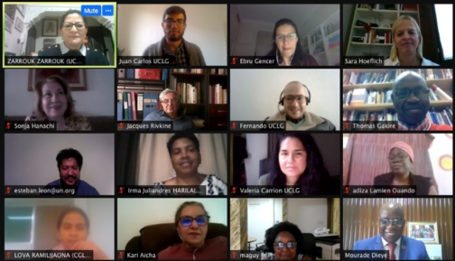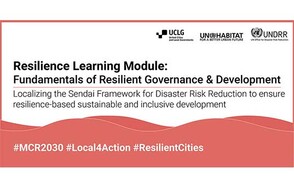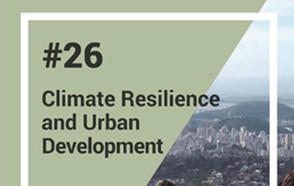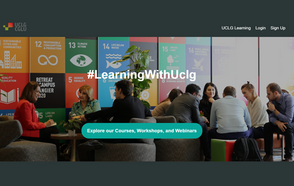
At 4th Edition of the African Forum of Territorial Managers and Training Institutes Targeting the Local Government (FAMI 4 - 2020)
On 25 November 2020, UCLG’s learning team, together with the partners UNDRR Geti and UN-Habitat Cities Resilience Profiling Program (CRPP) facilitated a workshop for 35 territorial managers and academia participants regarding the fundamentals of resilient governance and development.
The workshop was built around the first volume of the Resilience Learning Module, focusing on the potential integration of resilience principles into local governments’ policy cycle. It provided a base framework for territorial managers to understand risk and resilience, enhance risk governance, identify available finance mechanisms and opportunities, and formulate their DRR and resilience building strategies along their action plans while building capacities for implementation.
The introduction to the session contained several consultation exercises on the perception of risk and resilience (refer to graph). A presentation regarding DRR in the African context and its links with other global agendas by Sanjaya Bathia (UNDRR GETI) highlighted the need for a holistic approach at the local level, and it was complimented with a brief overview of resilience principles and the policy cycle by Juan Carlos Uribe (UCLG).
The second half of the session consisted of a panel discussion moderated by Sara Hoeflich (UCLG Learning Director) initiated by Dr. Ebru Gencer (CUDRR+R) who tackled the role of governance, assessments, and finance strategies, while Mr. Mourade Dieye (City of Dakar) illustrated a concrete example of the city´s resilience challenges and strategy. Dakar is internationally connected and Mr. Mourade gave an insight on using UN-Habitat´s CRPP methodology to address and mitigate climate change, urban congestion, and lack of mobility.
Esteban Leon (director CRPP UN-Habitat) emphasized the unique character of each city and the importance of resilient strategies and actions being developed according to specific contexts. However, the role of Local Governments and their associations is similar and is well highlighted in the Resilience Learning Module that UCLG, UNDRR and UN-Habitat co-developed. In this context, Jean Baptiste Kirimwizigo (Burundi) of the EALGA (East African Local Government Association) exposed about the importance to foster an enabling national environment that allows local governments to increment decentralization policies to act at local levels as a base for developing resilient strategies and governance.
Panelists and participants emphasized the importance of effective decentralization, autonomy, and resources to create and implement appropriate resilience strategies and ensure continued public service provision. They not only agreed to these factors but also enhanced the discussion highlighting aspects like local funding, the importance of the preservation of traditional knowledge, the role of the youth and women, access to health services, and resettlement after a disaster. This was very clear also during the open debate, where participants discussed resilience using an example of conservation of historic buildings in city centers and service management.
The Resilience Learning Module will continue to be rolled-out in 2021 across different regions in close collaboration with each UCLG section. The approach intends to contextualize and build on the experience, knowledge, and needs of our diverse membership.













